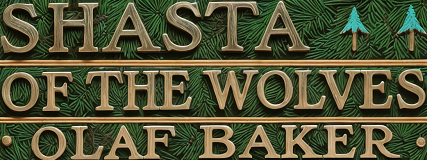 |  |
Wild at Heart Homepage | Contents | Previous Chapter
CHAPTER XVIII
THE WOLVES AVENGE
Presently, at a given sign, the procession started. It was led by an old medicine-man, who moved slowly forward, singing a medicine-chant as he walked. He was extremely old and shrivelled and was smothered in paint and feathers. And lie had a husky voice that cut the air like a saw. Behind him rode the chief on horseback, a splendid figure of a man, upright as a dart, and magnificently dressed. Immediately after him came Shasta on the travois. The braves followed in a long line.
Shasta’s heart was heavy with fear. No one told him what was going to be done with him, yet a terrible foreboding made him shiver now and then. And yet the birds twittered, and the air was fragrant with the scent of the dew drenched grass, and the sky blue between the trails of mist. All the world seemed full of life, and free, except himself only, bound and aching on the travois.
When the procession reached the top of a high ridge, the travois was stopped. The Indians lifted Shasta out and bound him to a stake driven into the ground. Around the stake they piled fagots of wood. When this was finished, the medicine-man sprinkled dried sweet grass over the pile so that when the flames rose up there might be a pleasant smell. During the preparations the braves arranged themselves in a large circle about the stake. As soon as the arrangements were completed, they waited for the medicine-man to light the fire, and sing the words which would be the signal for the opening of the dance. There was a pause. For a few moments nothing happened. It was one of those strange pieces of silence which drop sometimes even into the centre of civilized life, and people become uneasy--they could not tell you why. Only the mist went on, trailing over the ridge, swaying weirdly as the air pushed. It was still cold with the freshness left by the dawn. And although the sun had already risen, his beams were not strong enough as yet to dispel the dense masses of mist that kept rising from all the lower grounds. Near or distant, so far as Shasta’s keen ears could detect, nothing stirred. The fat blue grouse which had been feeding on the blueberries had fled at the Indians’ approach. The old coyote who had made her den on the south side of the hill was out hunting with her young ones and had not yet returned. For any sight or sound that declared itself, the lonely ridge at the edge of the prairies was a dead lump of burnt-up summer grass where not a living creature stirred. In that tremendous pause when all the world seemed to be waiting, Shasta threw back his head and gave the long gathering-cry of the wolves.
That call for help went ringing out far from the summit of the ridge. The hollow places sucked it in, and gave back sobbing echoes of its desperate need. One long cry that was not an echo, came from the hills in answer. That was all. Then the silence of the Wild closed down, and you could hear your heart beat in your side. From the prairies, from the hills, from the mountains beyond, no sound came. The familiar shapes of things were there as before; but they were dumb, blind, motionless, strangled in the mist. Close by a small fire already burning, the medicine-man stood with a forked stick in his hand, ready to take the live coal which should light the fagots about the stake. And as he stood, he kept repeating to himself now and again the strange words of a world-old medicine-chant, so strange and old that even for him the original meaning of the words had departed, leaving crooked shapes and sounds behind. The eyes of all the assembled Indians were fastened intently upon him. When he should have finished the chant, he would take the live coal from the fire, and the great death dance would begin. It was the dance by which they would celebrate the burning of the evil spirit or “medicine” which they believed Shasta embodied, and which, once destroyed, would enable them to vanquish all their foes. And then, when the dance began, and became wilder and wilder as the flames mounted higher at the stake, the whole hill-top would be alive with Indian shapes that swayed madly in the mist.
But what shapes were those coming down from the foothills--those long, flowing shapes with tongues that lolled and eyes that shone? There was no warning sound that told of their coming. They flowed down the hillsides in a grey flood that rippled but did not break.
Down the hills, past the Indian camp, through the valley bottom, out on the prairie, it flowed uninterruptedly till it reached the foot of the ridge. And still, to all outward seeming, the world appeared exactly as it was before, as if the sun himself, with all the vast lonely spaces of sky and earth, and all the creatures they contained, were waiting for that terrible moment when the medicine-chant should cease.
As for Shasta himself, after that first despairing cry, he had not moved a muscle of his body. He felt that the end was near at hand; that nothing but a miracle could save him now.
The medicine-chant was drawing to a close. The medicine-man moved a pace or two nearer to the fire. Round the great circle of expectant braves there passed a thrill that went through them like swift flame. For a second or two Shasta felt as if his heart had stopped.
At that instant, a short, deep-throated bellow came up from the mist below. It was the signal for the attack. And there was no other warning. Yet there they all were--Nitka, Shoomoo, the foster-brothers who remembered Shasta, and the other brothers who did not, and many others besides, belonging to widely-sundered packs, hundreds and hundreds of them, all united under the leadership of the giant Shoomoo for the one great purpose of rescuing Shasta from the hands of his cruel foes.
Up the sides of the ridge they bounded--those long, grey bodies that seemed buoyant like the mist.
When they reached the summit, there was not an instant’s pause. In one ringing wolf-voice, the whole of the united packs gave tongue.
Already the medicine-man had taken the live coal on the stick and was just about to set it to the dried grass round the stake when he was hurled to the earth by the leaping form of a tremendous wolf--none other than Shoomoo himself!
As he fell, an Indian darted forward, intending to bury his tomahawk in the wolf. But before he could do so, Shoomoo had leaped away from the prostrate figure, and in an instant had thrown himself on his assailant. There was a gleam as the raised tomahawk caught the light. Yet though it descended it infficted no fatal wound, and the Indian was borne helplessly to the ground, from which he never rose again.
The Indians fought desperately, but they were hopelessly outnumbered from the first. There were wolves everywhere. If one was killed or disabled, half-a-dozen more instantly filled his place. They came from all quarters, surging up from the lower ground in waves that seemed as if they would never end. On every hand the fight raged furiously. On all sides it was the same mass of dark, leaping bodies, gleaming eyes, and white fangs that tore and slashed. And everywhere it was Shoomoo, Nitka, and the wolf-brothers that did the deadliest work. Shoomoo, himself, seemed to be everywhere at once. Over and over again, Shasta, shivering, and frenzied with excitement as he watched the progress of the fight, saw the giant form of the great father wolf hurl itself through the air, and strike some struggling Indian to the ground.
Would the wolves win? Would the wolves win?--That was the agonizing thought that made Shasta shake from head to foot. If they did, he was saved. If not--then all was lost. He would be doomed to die the terrible death by fire. He wrenched and strained in a vain attempt to loose his bonds. His utmost efforts were of no avail. Whatever was the result of the contest, he knew that he must remain helpless to the end.
Once or twice a wild despair seized him. There came a pause in the fight, as if the wolves wavered. Suppose, after all, the Indians were able to hold their own? In spite of their terrible losses, they had killed many of their wolfish foes. Numbers of them lay dead or dying. It would be small wonder if, after all, the rest should grow intimidated, and slink off. Yet after each temporary lull, there would be a fresh attack led by Shoomoo or Nitka, and again the air would ring with the terrible gathering cry of the packs.
At last the Indians could hold out no longer. Utterly unprepared as they were for this fearful horde of undreamed-of enemies; feeling, too, that their “medicine” had deserted them and that the Great Spirit, being offended, had abandoned them to their fate,--the survivors lost their presence of mind and fled shrieking down the hill.
Few, very few, ever found their way back to camp. It was the wolf triumph, the wolf revenge. The ridge, from end to end, was strewn with Indian dead.
It was Nitka herself who released Shasta, and her famous teeth which tore the thongs from his arms and legs, and, after long and patient work, at last set him free. And when he lay on the ground, almost too dazed to understand, with his whole body feeling like one big bruise, it was her loving tongue that comforted him, caressing him back to life.
The sun was already high in the heavens before Shasta was strong enough to move. Then, with Nitka on one side and Shoomoo on the other, and the wolf-brothers all about on every hand, Shasta started for home. But it was not the home of his Indian kin. It was the cave upon the Bargloosh, far away from the tread of human feet; the old strange home whose rocky walls seemed to him to hold the beginnings of his life.
* * * * * * *
Did he go back to his people later? Did he say good-bye to the wolf-folk forever, and forget the ways of the Wild? Perhaps. Who can say?
Perhaps Gomposh could tell you, or even Goohooperay. Or you might entice it out of Shoshawnee when his face goes red on the lookout butte towards the setting sun.
But if he went back, which is possible, I do not think he would ever forget. For the Wild, and the ways of its folk, are too great to be forgotten. And then, you see, he was Shasta of the Wolves!
THE END
Return to Top of Page | Contents